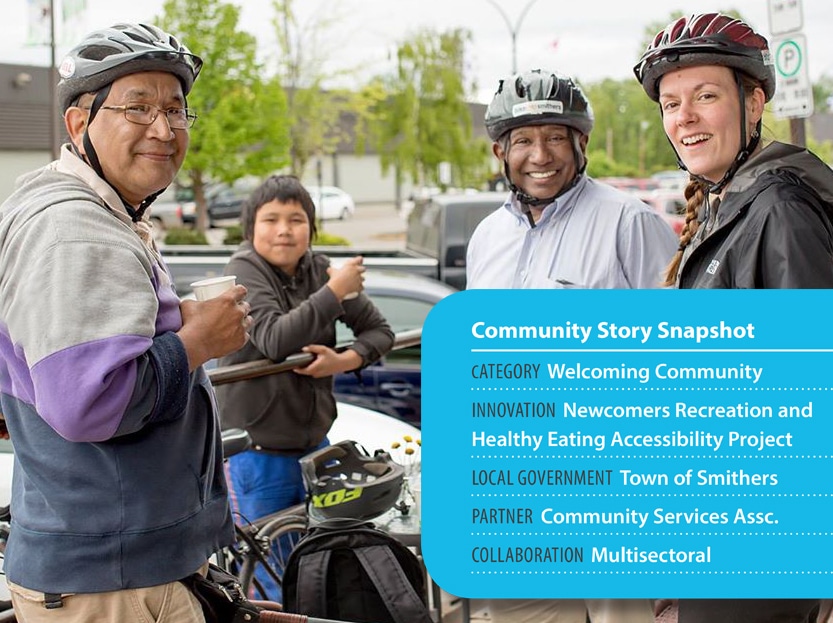The Town of Smithers’ Newcomers Recreation and Healthy Eating Accessibility Project partnered with community leaders to build a program that promotes social inclusion by creating a safe space to understand the local culture and try new things.

Rohitha Fernando took a deep breath of crisp air as he walked along the narrow mountain path on Smithers’ Hudson Bay Mountain. A carpet of alpine wildflowers stretched out beside his hiking group as they walked. The trail disappeared far into the distance where the craggy mountain peak stretched into the sky – 8600 feet above sea level.
Originally from Sri Lanka – a hot island country south of India – Fernando is enthusiastically embracing the recreational opportunities available in his new home. This is, in part, because of the Newcomers Recreation and Healthy Eating Accessibility Project – a program that invites newcomers to participate in facilitated sports and meal planning activities.
Learning from the Process
The project is jointly run by Smithers Community Services Association (SCSA) and the Town of Smithers and facilitated by Kimberly Unger. “One of the main goals of this project is to improve the lives of new immigrants,” explains Unger from her office located in the town’s train station. Newcomers to Smithers are from myriad of different places and professional backgrounds – some struggled with cultural and language barriers. SCSA worked with the Town and community groups to address these barriers by conducting surveys and focus groups to determine the best approach.
“The Recreation, Parks and Culture department would not have been able to make contacts with newcomers so easily without the SCSA’s existing programs and staff” — Andrew Hillaby
They discovered that newcomers often don’t know about the various recreation clubs that exist. They now provide information on amenities to newcomers and also help clubs and groups learn how to be more welcoming of newcomers.
The project offers an impressive list of regular recreational opportunities including: hiking, games nights, canoeing, bowling, skating, winter fun day, yoga, recreation fair, coffee groups and tennis lessons as well as workshops with local recreation clubs. This builds on other initiatives such as driving license support, housing and rental support, anthropological trips to first nation sites, potluck picnics, a community banquet and cook book.

Welcoming communities are important for the health and well-being of everyone who lives in British Columbia. When racism, language barriers, a lack of cultural sensitivity, and a feeling of not belonging in the community prevents people of different backgrounds from accessing community services, their mental and physical health suffers.
Recent research into social connectedness shows that people with extensive and strong support networks tend to have better physical health through lower rates of unhealthy behaviours (such as smoking, drinking, and an inactive lifestyle), a lower prevalence of mental illness, and more opportunities for sustained and secure employment.
Connections Between Partners & Stakeholders
SCSA’s approach involved close collaboration with the Town of Smithers Director of Recreation, Parks & Culture, Andrew Hillaby as well as the SCSA English Language and Multicultural Services program. Together they convened an advisory group. The Northern Health Authority supported the project. “It as a very good partnership,” says Hillaby, “ The Recreation, Parks and Culture department would not have been able to make contacts with newcomers so easily without the SCSA’s existing programs and staff.“
The Town of Smithers grant writer invited SCSA to participate in the project and helped apply for the PlanH Healthy Communities Capacity Building grant which funded the Newcomer Recreation and Healthy Eating Accessibility Project (including focus groups, workshops, and recreational activities).
Through working jointly on this project, the Town and SCSA increased their familiarity with the services offered in the community and the needs of new immigrants especially with regards to recreational activities.
Hillaby’s role evolved over time from being supportive to helping to set up more recreation activities in the third phase of the program. For example, the Town recently purchased ping pong tables – a popular activity identified in the program surveys – for after-school programs the fall to bring out some of the younger newcomers.

Andrew enjoys meeting participants and hearing their feedback. “As I got to know the newcomers I found out that some people wanted to play badminton, I connected them to the badminton club in town. Now there are five or six adults that go and play badminton on Sunday nights. It doesn’t cost us anything to make those relationships – it’s about connecting the dots.”
Innovative Outcomes and Impacts
Participants contribute ideas for activities. One of the more popular events was tennis lessons. “There was a range of ages; teens to people in their 80’s from all different cultures – having a great time. There were tennis balls flying left, right and centre,” remembers Unger. “The instructor was very personable – made everyone comfortable. Later that month a participant showed me photos of her playing tennis in her back yard with her grandson.”
“The next time someone invites them to go skating — they’ll say I‘ve tried it twice and they will go.” — Kimberly Unger
Unger found that over time the clients became more comfortable and built up a level of trust and confidence in participating in community activities. “They know the people [in the community] and are more confident to join a club and join general community events because they’ve done it before.” “The next time someone invites them to go skating, they won’t say I haven’t tried it – they’ll say I ‘ve tried it twice and they will go.”
The program integrates well with related healthy community initiatives, for example, the SCSA “Ground to Griddle Neighbourhood Kitchen” is an opportunity to cook and have a meal together. They focus on eating healthily, trying new recipes and finding out what food is available in the community and how to cook it. One client, with a large family had never used an oven before. It’s also a place where clients can share their knowledge. “We learn from clients, it’s empowering to share what they know, that’s a leadership piece – they share their recipes from their culture or simple things like how to cut a pineapple,” says Unger.
After trying several program ideas Unger has recommendations for other communities that want to try a similar initiative. “Let people try an activity for free with ‘Try-it days’ or ‘Bring a Friend Days.’ She advises others to keep expectations in check. “It’s a lot about building trust with the newcomers. If one or two people take away something –it’s worth it. It really does improve our clients’ health and well-being.”
Resources
- Welcoming Communities
- Inclusive Communities
- Social Connectedness
- Social Connectedness Action Guide
- Citizen Engagement
- IAP2 Spectrum of Engagement
More Information
Kimberly Unger
English Language & Multicultural Services
Smithers Community Services Association
3815B Railway Ave (PO Box 3759)
Smithers, BC, V0J 2N0
kunger@scsa.ca
250-847-9515
photo courtesy Annie Thompson photography




